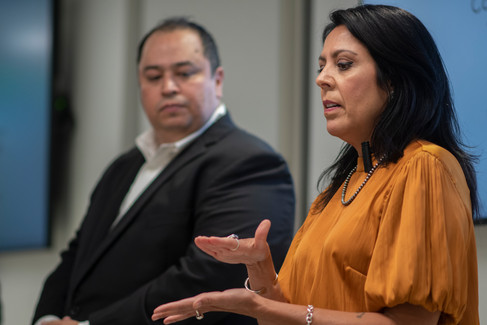The premise is simple: If you want to know what’s on the minds of Latino voters in Colorado, ask them. That’s been the guiding principle behind the nonpartisan Colorado Latino Policy Agenda for three years now, which quickly evolved into the largest survey of Latino registered voters in the state and the primary source for informing the direction of our advocacy and public policy work since 2021.
Today we released the 2023 Colorado Latino Policy Agenda (CLPA) report, our third annual effort to provide insight to elected officials, community leaders, media and others interested in the demographic makeup and views of Latinos in Colorado on pressing policy, political, and other relevant issues in the state. Co-led by Voces Unidas and the Colorado Organization for Latina Opportunity and Reproductive Rights (COLOR), the statewide poll of 1,600 Latino registered voters offers a representative, nonpartisan snapshot of views of our community, the second-largest and second fastest-growing ethnic voting bloc in the state.
Economic struggles continue to dominate the list of concerns for Latino voters in Colorado, who rank addressing inflation and the rising cost of living as their top policy priorities in the survey. Low wages, healthcare costs and the affordable housing crisis also rank among the top concerns as rising prices continue to outpace wages throughout Colorado’s Latino community.
Among the key findings in this year’s report:
A third (33%) of Latinos said their financial situation has grown more dire in 2023, while another third (34%) say their situation has not changed since 2022, when half of Colorado’s Latino community reported that their financial situation had gotten worse.
More than a third (34%) of Latinos in Colorado say they “cannot afford” or “can barely afford” where they live, prompting “homelessness” to emerge as the third-ranked priority for state officials to address.
Latino support for protecting abortion rights in Colorado remains strong, cited as a top-five priority (18%) for federal officials to address and serving as motivation to vote for more than half (52%) of Latinos polled.
Addressing gun violence and mass shootings also remains a top-five priority for Latinos in Colorado, with an alarming 81% of respondents saying they are concerned about the prospect of a mass shooting that targets the Latino/immigrant community.
As for measures on the ballot this fall, strong majorities support Proposition HH to reduce property taxes (78%) and Proposition II to fund preschool programs (75%).
We encourage you to read the entire report linked here.
“After three years of research it is clear that the challenges facing Latinos when it comes to jobs, housing and the economy are severe and in need of significant action from officials at the local, state and federal levels,” said Alex Sánchez, President and CEO of Voces Unidas. “With fresh data revealing new priorities for Latinos, this year’s report also allows us to expand on our research base from 2021 and 2022 as we work with elected officials and community leaders to recommend and explore solutions for the future. We hope they will take it to heart and consider the diverse needs, priorities, and growing voice of the Latino community statewide.”
Polling for the 2023 CLPA was conducted online and over the phone, in both English and Spanish. BSP Research, a national firm with 20-plus years of helping community-based organizations research a diversifying United States, fielded the poll from July 1 - July 27. The margin of error was ±2.4%. The poll was designed to oversample in rural areas to provide the opportunity to compare results across four main geographical regions of the state and congressional districts, when possible.
“As the largest poll of Latino registered voters in the state, the Colorado Latino Policy Agenda provides a robust annual data set offering valuable perspectives on both national and local issues intended to inform policymakers at all levels of government about the needs and priorities of the state’s substantial Latino population in the year ahead,” said Dr. Gabriel Sanchez, who led the poll for BSP Research. “Measured alongside our work from previous years, the 2023 survey provides an opportunity to reinforce the economic vulnerability of many Latino residents of Colorado. Unfortunately, even as the economy is beginning to show signs of improvement, a sizable portion of the Latino community still faces tremendous economic challenges.”
Latinos in Colorado continue to struggle financially and rank economic concerns among four of the top six most important issues for state and federal elected officials to prioritize in 2023. Addressing inflation topped the list of both state (40%) and federal (38%) priorities, followed by improving wages and income (32% federal, 30% state) as the cost of living continues to outpace income levels of the community, particularly when it comes to healthcare (No. 4) and housing (No. 6) as Colorado’s population growth continues to surpass national averages.
“Addressing affordable and sustainable housing” polled slightly higher as a priority for state policymakers than federal, with 19% of Latino voters identifying it as a top priority, reinforced by overwhelming bipartisan support (70+%) for every policy intervention included in the survey aimed at reducing housing costs and making housing more accessible. A robust 85% of Latino registered voters agree that “cities and towns should be required to build more affordable housing near jobs, schools, and public services,” while 78% of respondents agree with the statement that “politicians talk about creating more affordable housing, but I have not seen any real change in access to affordable housing where I live.”
Addressing gun violence (22%) is also a recurring priority for Latino voters in 2023, ranking as the third-most important issue for elected officials to address at the federal level (up from No. 4 in 2022). While the percentage was slightly lower at the state level (20%) this year, gun violence remained among the top five most important issues facing the Latino community at both the federal and state levels, even as homelessness (25%) emerged as the third-most important issue for state officials to address.
Latino voters in Colorado continue to rank protection of immigrant rights as a top policy priority for federal officials, as Latino registered voters consider it one of the 10 most important issues for Congress and the President to address for a second consecutive year.
Poll respondents overwhelmingly support humane and common-sense-minded immigration policy reforms, including 80% support for the federal government doing more to support undocumented immigrants “who have lived, worked and paid their taxes in the U.S. most of their lives.” If Congress refuses to take action, 70% of respondents agreed that President Biden should pass an executive order providing legal permits that allow undocumented immigrants to live and work in the U.S. without fear of deportation.
While a majority (53%) of Latino voters believe Colorado is currently headed in the right direction, even more (57%) believe the nation is on the wrong track, likely due to the prevailing polarized political climate underscored by unprecedented political violence and misinformation surrounding the fairness of our election systems. The atmosphere is generating concern and fear among Latino voters as we approach the 2024 election, including 81% of Latino registered voters expressing concern about the prospect of a mass shooting that targets the Latino/immigrant community. Similarly high percentages are concerned about political unrest and violence, including violent protests spurred by politicians, candidates and supporters who refuse to accept election results when they lose.
More than half (52%) of Latinos polled say the laws that have been passed around the nation to limit or ban abortion make them more likely to vote in 2023. Additionally, a solid majority (62%) in this year’s poll report that they would support a hypothetical future ballot initiative making abortion rights stronger in Colorado by allowing state-funded insurance programs to cover abortion costs.
“The 2023 CLPA reinforces what we already know – that our community values the freedom to make their own decisions and is even more motivated to protect and expand abortion access in Colorado through the ballot box as access diminishes in other states,” said Dusti Gurule, President and CEO of COLOR. “Considering the economic inequities for Latinos in Colorado, there is a strong case for expanding state-funded insurance programs to cover abortion care. Being able to lead safe, healthy, and self-determined lives is imperative for our community across Colorado.”
Beyond reproductive health, this year’s survey provides a better understanding of how Latinos in Colorado use healthcare and the challenges that they face accessing the broader healthcare they need. Nearly half (46%) of those polled say they have avoided medical care or been forced to cut corners due to the cost, further emphasizing the need for cost reduction as a top priority for 20% of Latino voters. What’s more, just over 1-in-4 (26%) say they have faced discrimination or unfair treatment when seeking healthcare, causing an additional 10% of Latinos polled to avoid necessary healthcare because of a prior experience with discrimination at a hospital, clinic or other medical facility.
With numerous district school board elections on the horizon in 2023, education policy is also on the minds of Latino voters, as some 77% of voters expressed concern about the quality of education in the state and 73% reported concerns that there is “little effort by school leaders to involve parents in their children’s education.” A lack of diversity in school staff and school boards that do not reflect the diversity of the students is also a major concern for Latino parents, as it further distances them from the decision-making process in spite of their desire to be more involved in their children’s education.
As always, it will take some time to thoroughly digest the data found in the 2023 CLPA, but none of it is taken lightly. This information, taken directly from the Latino community, serves as the foundation for the three pillars of our work – organizing and advocacy, policy and research, leadership, and civic engagement – and continues to steer our course for the future. We asked, you answered, enabling us to remain dedicated to building and growing our community’s power and influence by ensuring that Latinas and Latinos in the central-mountain region and throughout Colorado have their voices amplified.





















